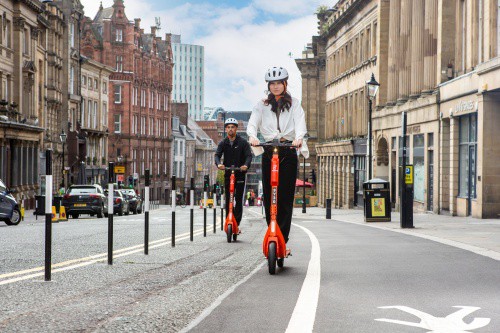
E-scooter brain with smart sensors to be trialled in four cities – FutureIoT
Singapore-based Neuron Mobility will conduct a six-month trial of its new “e-scooter brain” across four cities in Australia, Canada and United Kingdom.
Fitted into the company’s N3 e-scooters, the new brain includes a range of newly developed technologies such as the High Accuracy Location Technology (HALT), the Rapid Geofence Detection (RGD), and an array of multi-function sensors and a new proprietary vehicle operating system.
Used together, these features will facilitate what is touted to be the world’s first Dangerous Riding Detection (DRD) system for e-scooters, which allows Neuron Mobility to warn of unsafe behaviours in real time while also profiling users and incentivising safe riding.
“Our trial is the first of its kind – we’ll have 1,500 e-scooters in cities across the world being tested in real-world situations to improve rider behaviour and safety. With the introduction of ultra-precise location, rapid response to geofencing, plus an array of new sensors we’ll be able to correct rider behaviour while also putting the cities more in control of their e-scooter programmes,” said Zachary Wang, CEO of Neuron Mobility.
The e-scooter brain will initially be beta tested on 1,500 e-scooters in Ottawa in Canada, Brisbane and Darwin in Australia, and Slough in the United Kingdom. The trials will take place over a six-month period and will assess how riders behave in all kinds of real-life situations and how good riding can be encouraged. The findings will be evaluated, the technology refined, and selected features will be rolled out across Neuron’s fleet internationally over the next six to 12 months.
Wang pointed out that there has been plenty of industry talk from micromobility operators about how to apply new technology to better control e-scooters in cities.
“But until now it’s mostly been aspirational or theoretical,” he said.
Under the hood: HALT and RGD
Neuron Mobility claims that HALT is the next step in e-scooter precision location tracking. Using a sophisticated fixed base station within a city, which connects wirelessly to a receiver in the e-scooter, it corrects GPS inaccuracies, allowing every vehicle’s location to be tracked in real-time down to a range of within 10cm. This is at least 50 times more accurate than the e-scooter industry’s average GPS location system which plots a vehicle’s location to 5 – 10 metres or more within cities
Meanwhile, the company’s Rapid Geofence Detection (RGD) feature works with HALT to give unparalleled control of how e-scooters are managed in cities. With RGD, when an e-scooter crosses a geofence, such as a no-ride or go-slow zone, the vehicle can respond in 0.3 seconds, rather than the 6-12 seconds it currently takes most rental e-scooter models to react. This is achieved by storing geofence data — and rules of how an e-scooter should behave when it crosses a geofence — in the e-scooter’s brain on the e-scooter rather than in the cloud, which significantly cuts down on processing time.
Fitted into the company’s N3 e-scooters, the new brain includes a range of newly developed technologies such as the High Accuracy Location Technology (HALT), the Rapid Geofence Detection (RGD), and an array of multi-function sensors and a new proprietary vehicle operating system.
Used together, these features will facilitate what is touted to be the world’s first Dangerous Riding Detection (DRD) system for e-scooters, which allows Neuron Mobility to warn of unsafe behaviours in real time while also profiling users and incentivising safe riding.
“Our trial is the first of its kind – we’ll have 1,500 e-scooters in cities across the world being tested in real-world situations to improve rider behaviour and safety. With the introduction of ultra-precise location, rapid response to geofencing, plus an array of new sensors we’ll be able to correct rider behaviour while also putting the cities more in control of their e-scooter programmes,” said Zachary Wang, CEO of Neuron Mobility.
The e-scooter brain will initially be beta tested on 1,500 e-scooters in Ottawa in Canada, Brisbane and Darwin in Australia, and Slough in the United Kingdom. The trials will take place over a six-month period and will assess how riders behave in all kinds of real-life situations and how good riding can be encouraged. The findings will be evaluated, the technology refined, and selected features will be rolled out across Neuron’s fleet internationally over the next six to 12 months.
Wang pointed out that there has been plenty of industry talk from micromobility operators about how to apply new technology to better control e-scooters in cities.
“But until now it’s mostly been aspirational or theoretical,” he said.
Under the hood: HALT and RGD
Neuron Mobility claims that HALT is the next step in e-scooter precision location tracking. Using a sophisticated fixed base station within a city, which connects wirelessly to a receiver in the e-scooter, it corrects GPS inaccuracies, allowing every vehicle’s location to be tracked in real-time down to a range of within 10cm. This is at least 50 times more accurate than the e-scooter industry’s average GPS location system which plots a vehicle’s location to 5 – 10 metres or more within cities
Meanwhile, the company’s Rapid Geofence Detection (RGD) feature works with HALT to give unparalleled control of how e-scooters are managed in cities. With RGD, when an e-scooter crosses a geofence, such as a no-ride or go-slow zone, the vehicle can respond in 0.3 seconds, rather than the 6-12 seconds it currently takes most rental e-scooter models to react. This is achieved by storing geofence data — and rules of how an e-scooter should behave when it crosses a geofence — in the e-scooter’s brain on the e-scooter rather than in the cloud, which significantly cuts down on processing time.
futureiot.tech



